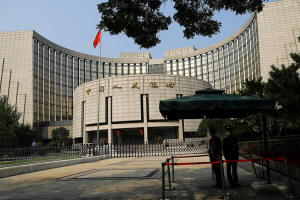China new bank loans rise far less than expected in May as demand
wobbles
 Send a link to a friend
Send a link to a friend
 [June 14, 2024] By
Ellen Zhang and Kevin Yao [June 14, 2024] By
Ellen Zhang and Kevin Yao
BEIJING (Reuters) - New bank lending in China rebounded far less than
expected in May and some key money gauges hit record lows, suggesting
the world's second-largest economy is still struggling to regain its
footing even as the central bank seeks to bolster confidence.
Chinese banks issued 950 billion yuan ($130.93 billion) in new yuan
loans last month, compared to 730 billion yuan in April, according to
Reuters calculations based on the latest data from the People's Bank of
China (PBOC) released on Friday.
Analysts polled by Reuters had predicted loans would rise to 1.255
trillion yuan but would still be below the 1.36 trillion yuan issued in
May last year.
"China’s credit extension came in lower than expected in May, suggesting
that the deleveraging in the households continues," said Zhou Hao, chief
economist at Guotai Junan International.
But Zhou said China's central bank may be reluctant to cut interest
rates any time soon, as that could lead to further depreciation of the
yuan currency as the U.S. Federal Reserve seems in no hurry to start
cutting its rates, which are buoying the dollar.
"Balancing all the factors, we think that the PBOC would refrain from
policy rate cuts for now but provide more targeted support via relending
programs over the foreseeable future," he said.

Over recent months, a flurry of data has shown different parts of the
$18.6 trillion economy recovering at varying speeds, heightening
uncertainty about its outlook. Activity data for May will be released on
Monday along with a key central bank policy rate announcement.
The PBOC not longer provides monthly credit and money supply breakdowns
but Reuters calculated the May figures based on the bank's Jan-May data
compared with the Jan-April figure.
New loans totalled 11.14 trillion yuan for the first five months of the
year, the PBOC said, compared with 10.19 trillion yuan in the first four
months.
Household loans, mostly mortgages, expanded 75.7 billion yuan in May,
compared with a contraction of 516.6 billion yuan in April, according to
the bank's data and Reuters calculations.
Corporate loans dropped to 740 billion yuan from 860 billion yuan in
April.
The PBOC has pledged to step up support for the economy and promote a
rebound in prices as deflationary pressures persist, but it has also
cautioned against the risk of too much cash sloshing around the banking
system as credit demand weakens.
Reuters reported last month that the PBOC has guided some banks to boost
lending, even as banks face growing profitability pressures.
[to top of second column] |

Paramilitary police officers stand guard in front of the
headquarters of the People's Bank of China, the central bank (PBOC),
in Beijing, China September 30, 2022. REUTERS/Tingshu Wang/File
Photo

China has set an economic growth target of around 5% for 2024, but
weak demand and a protracted property downturn is weighing heavily
on activity, prompting expectations for cuts in interest rates and
banks' reserve requirements.
In May, China unveiled a raft of measures to revive its property
market, including a 300 billion yuan relending facility to fund
state firms' purchases of completed unsold apartments for affordable
housing. But analysts say it could take years for the sector - once
a major economic growth driver - to recover.
Broad M2 money supply last month grew 7.0% from a year earlier - the
lowest on record and below a Reuters poll estimate of 7.2% growth.
It rose 7.2% in April.
M1 money supply, which consists of cash in circulation and corporate
demand deposits and is seen as a major indicator of private business
confidence, fell 4.2% on-year, the sharpest drop since records
began.
M2 money supply includes M1, fixed corporate, household and other
deposits.
Outstanding yuan loans rose 9.3% from a year earlier - a record low
- compared with April's 9.6% rise. Analysts had expected 9.5%
growth.
However, annual growth of outstanding total social financing (TSF),
a broad measure of credit and liquidity in the economy, picked up
slightly to 8.4% in May from a record low of 8.3% in April.
"Bank loan growth in China was the slowest on record in May, but
accelerated government bond issuance helped broader credit growth
edge up. Fiscal loosening should support further gains in the near
term," Capital Economics said in a note.
China started issuing 1 trillion yuan in ultra-long government bonds
in May.
TSF last month rose 2.07 trillion yuan, following a rare contraction
of 72 billion yuan in April. Analysts polled by Reuters had expected
May TSF of 2.2 trillion yuan.
($1 = 7.2558 Chinese yuan renminbi)
(Reporting by Ellen Zhang and Kevin Yao; Editing by Kim Coghill)
[© 2024 Thomson Reuters. All rights
reserved.]
This material may not be published,
broadcast, rewritten or redistributed.
Thompson Reuters is solely responsible for this content.
 |